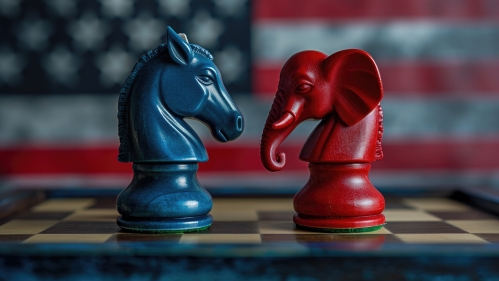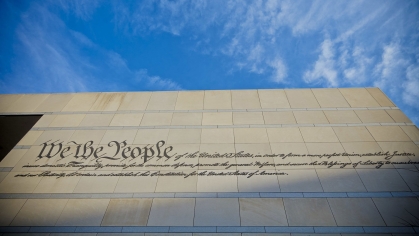The Rhetorical Politics of Political Persuasion

English professor breaks down how campaign rhetoric is about much more than the power of words.
Viewers of the recent debate between Vice President Kamala Harris and former President Donald Trump witnessed the cut and thrust of American politics, with the candidates now balancing on a 50/50 knife’s edge in the polls. Yet, the only weapon wielded in the debate, held at the National Constitution Center in Philadelphia, was words. But was there more to how viewers heard than what they were listening to?
Yes, there was. This is according to Rutgers University–Camden English Professor William FitzGerald, whose specialization is the field of rhetoric, which—in part—investigates how language is used to organize and maintain social order. FitzGerald claims that rhetoric can build or destroy societies, create or stop change, and, crucially, work toward preserving civic life.

“Americans across the country looked to this debate for the qualities of leadership and empathy that will earn their trust and their vote,” FitzGerald said. “While many viewers tuned in with minds made up—to root for their candidate or to participate in a familiar ritual of civic life— some, no doubt, were moved by a direct comparison of candidates to choose one over the other or to get more involved in persuading others.
“The debate let voters see for themselves what they want in their next president. The candidate’s words and body language gave us lots of evidence to help make up our minds.”
FitzGerald admits none of this is breaking news, because the art of rhetoric has been skillfully applied and studied as far back as the ancient Greeks. However, he cautions that citizens today must grasp that persuasion can be a powerful factor in deciding how voters make their ballot choices, because democratic politics is largely about making informed choices.
Politicians throughout history have made arguments framed by common rhetorical elements. FitzGerald said the basics of rhetorical speech include the use of metaphors, ad hominem attacks on opponents, appeals to expertise, moral appeals, and many other techniques. But he added that political arguments are highly multidimensional and personality-driven, so it can be difficult for citizens to recognize where the line lies between persuasion for the greater good and propaganda that serves one, or a few, individuals.
Aristotle, the Greek philosopher who wrote a book titled Rhetoric in the fourth century B.C., identified rhetoric as an essential tool for debate. He claimed rhetoric is a means for persuading a general audience using obvious knowledge to resolve practical issues.
“Persuasion is a fundamental skill for serving in public life,” FitzGerald said. “But this technique can differ in debates, which may be motivational in capturing votes. Debaters can use a one-sided argument for a purpose or an agenda. That agenda is usually singularly focused on persuading voters to vote for them.
“The challenge is how, in a roughly equally divided country, do candidates win over smart, engaged voters? People must learn about the issues and make their minds up from more than the words they hear in a single highly managed and agenda-driven debate.”

FitzGerald said it is likely that the biggest challenge is how the candidates win over not only undecided voters but also the “unpersuadables.” “It is vital that the forgotten non-voters who remain unregistered, or the voters who vote a certain ticket because that is how they always vote, or those who are set to withhold their vote because a cause they may support is not a priority for a candidate they may otherwise support, are reached before November 5,” he said.
A literal trump card, FitzGerald said, may be found among marginalized voters in what is known as the “manoverse.” The manoverse is defined by the New York Times as a constellation of YouTubers, pranksters, and streamers who influence young men to support “the bro vote.”
“These men are largely silent voters,” FitzGerald said. “Almost uniquely in this election cycle, the manoverse is a diffuse voting bloc that can make a decisive difference.
“Each candidate needs these kinds of marginalized voters, young or old, who feel forgotten. The skillful use of rhetoric can bring them into one or another fold by using language that persuades them they are valued.”


